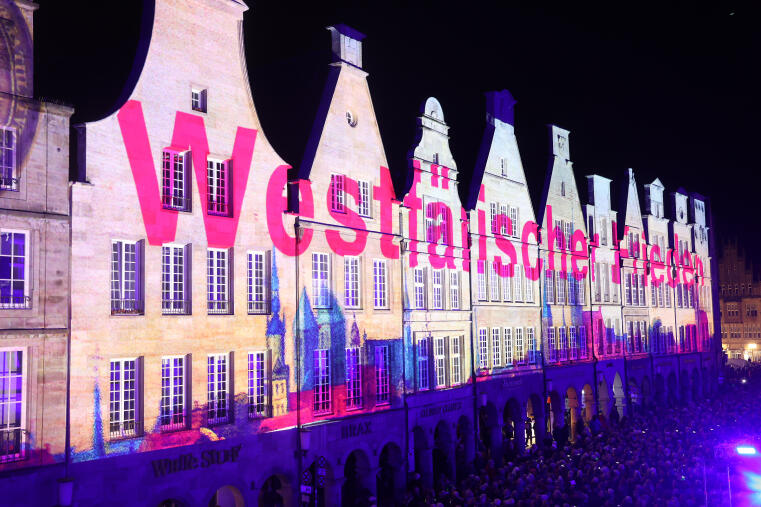
375 years of the Peace of Westphalia
Current and historical contributions of the Cluster of Excellence in the 2023 anniversary program in Münster
In 2023, the Cluster of Excellence “Religion and Politics” contributed a wide range of events on peace issues past and present in the City of Münster’s anniversary programme “375 years of the Peace of Westphalia”. The events focused on global perspectives concerning the paths that could lead to peace when crises around the world threaten a stable future. Also discussed was the question of how it is possible not only to make peace, but also to maintain it.
The Cluster of Excellence has for years been analyzing conflicts past and present, as well as strategies and symbols of peace. “In the face of war in Europe and crises across the world, peace and conflict research is needed more than ever to work out the conditions for global peace in the 21st century”, says Cluster speaker Prof. Dr. Michael Seewald. “The events in the anniversary year allowed us once again to promote dialogue between academics and the general public, as well as discussion with international politics and civil society – on an equal footing with representatives of the global South, without whom a global peace is inconceivable”.
The highlight of the anniversary year of 2023 was the Westphalian Peace Summit on 24 October, the historic date of the Westphalian peace treaty, when international guests from the global North and South discussed the paths that could lead to peace when crises around the world threaten a stable future. The guests included Nobel Peace Prize winner Leymah Roberta Gbowee, the Indian political scientist Prof. Dr. Ummu Salma Bava from New Delhi, and the director of the Stockholm International Peace Research Institute (SIPRI), Prof. Dan Smith.

The symposium “Winning the peace from 1648 to today” addressed the question of what past peace treaties can teach us in the face of current conflicts. Organized by the Landschaftsverband Westfalen-Lippe (LWL), together with the City of Münster and the Cluster of Excellence, the symposium at the LWL Museum of Art and Culture featured historian Prof. Dr. Ricarda Vulpius from the Cluster of Excellence.
The discussion evening “How stable is peace? The Peace of Westphalia as a treaty under international law” saw researchers discuss the long-term effects of the Peace of Westphalia 375 years ago from a historical, legal and constitutional perspective. Organized by the Cluster of Excellence “Religion and Politics” and the Käte Hamburger Kolleg “Legal Unity and Pluralism”, the discussion evening shed light on how an agreement was reached after 30 years of war that brought peace to Europe and a new, forward-looking system of international law.

The international conference “Winning the peace? A comparison of cities after 1648” focused on what happened in cities such as Münster, Trier and Utrecht after the peace treaty 375 years ago. How did these war-torn cities manage to live together after the end of the war? What effects did the war have on the spatial reorganization of cities between reconstruction and the post-war economy? The conference was organized by the Cluster of Excellence “Religion and Politics”, the Münster City Archives, and the Institute for Comparative Urban History at the University of Münster.
The anniversary programme in Münster comprised a total of around 300 events organized by 50 institutions and members of the general public at more than 40 locations. It was created in the “1648 Dialogues on Peace” working group of the “Alliance for Science”, where figures from the city, academics and politicians develop event programmes that link the history of the city of the Peace of Westphalia with current peace issues. The Cluster of Excellence has been involved since 2009 through the Head of Research Communication, Viola van Melis.

